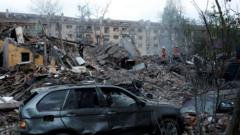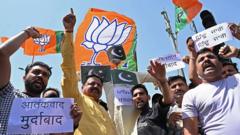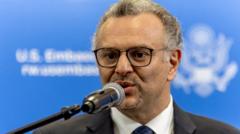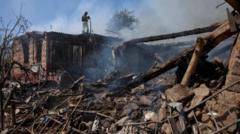Amid a deadly attack on Kyiv, President Zelensky prioritizes urgent rescue efforts, returning immediately from South Africa after crucial discussions with President Ramaphosa
Zelensky Abruptly Ends South Africa Visit Amid Devastating Kyiv Attack

Zelensky Abruptly Ends South Africa Visit Amid Devastating Kyiv Attack
Ukrainian President's diplomatic trip cut short as missile strikes escalate violence back home
In a sudden turn of events, Ukrainian President Volodymyr Zelensky has cut short his inaugural visit to South Africa following a catastrophic overnight attack on Kyiv by Russian missiles and drones. Reports indicate that the assault resulted in at least nine fatalities and over 70 injuries, including several children, as local officials assess the damage. In a statement posted on X, Zelensky expressed his commitment to return to Ukraine "immediately" after a brief meeting with South African President Cyril Ramaphosa, emphasizing the necessity of ramping up diplomatic outreach amid the turmoil at home. He detailed ongoing rescue operations initiated in response to the attack, noting a "significant destruction" in the capital.
The conflict has seen increasing tensions, particularly after Zelensky affirmed Ukraine’s unwillingness to concede Crimea, a region annexed by Russia in 2014, regardless of pressures from external parties. US President Donald Trump criticized Zelensky Tuesday, claiming that his stance was detrimental to potential peace negotiations. Trump suggested that a resolution to the ongoing war was "very close," yet highlighted that Zelensky's persistence against accepting US terms could further prolong the conflict.
Correspondingly, US Vice-President JD Vance shared the administration’s perspective for a ceasefire, indicating that a deal would necessitate both Ukraine and Russia to make territorial concessions. However, he refrained from detailing specific areas that might be affected. When questioned at the White House about recognizing Russian sovereignty over Crimea, Trump reiterated his primary interest in ending the war, a proposition at odds with established international norms regarding territorial integrity.
The conflict has seen increasing tensions, particularly after Zelensky affirmed Ukraine’s unwillingness to concede Crimea, a region annexed by Russia in 2014, regardless of pressures from external parties. US President Donald Trump criticized Zelensky Tuesday, claiming that his stance was detrimental to potential peace negotiations. Trump suggested that a resolution to the ongoing war was "very close," yet highlighted that Zelensky's persistence against accepting US terms could further prolong the conflict.
Correspondingly, US Vice-President JD Vance shared the administration’s perspective for a ceasefire, indicating that a deal would necessitate both Ukraine and Russia to make territorial concessions. However, he refrained from detailing specific areas that might be affected. When questioned at the White House about recognizing Russian sovereignty over Crimea, Trump reiterated his primary interest in ending the war, a proposition at odds with established international norms regarding territorial integrity.





















